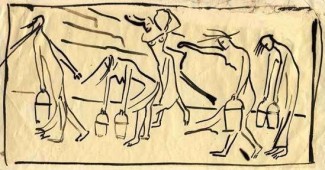Innis mór
We scrambled up the craterous outcrop
That ruptured like an isle in the gray sands
Spread thin around Cille inne Bay. A sop
Of drying kelp lay tangled in red strands,
Half-covering a shallow pool, inside
Which a few snails would slink till the next tide.
Some other aged and rough concentric shells
Hung on a thread of weeds as necklaces hang.
The mussels and the vast Atlantic swell
Lapping away at Innis mór then rang
Of my first time gone musseling in Bar Harbor:
Snatching the stony things in childish labor,
Not knowing such as these and snails were meant
To boil in the gray and white-flecked pot
Later that night, for dinner. Shells—once sent
Adrift on every patterned current or shot
With all the indifference of lead by waves
Breaking against this putty shore—are saved,
Or stranded, really, in a placid pool
No more the ocean for its having come
From there. Such shells are signs for how it feels
To be on Aran or in Maine. They sum
Almost to the same place for one like me,
Who visits with scarce responsibility,
For whom the taste of salt mist on the tongue
Is a sure sign that I am far from home.
These sharded terraces of lime are long
From the flat lands I know, though I would know
This dark splintering water in its full
And endless siege on the Dún Aengus shoals.
These sediments, these thickening shells, must seem
For all their subtle mouths and creeping shifts
Proof that no matter where I go, my being’s
Inflexibly one. This isle may be a gift
Of sorts, but I can’t grasp it whole or take
Just what I need without a sundering break.
Nor can its crooked paths be measured out
As if all were mere property of the mind.
My coming here makes me a part of it,
My sailing makes each cut wave partly mine,
To set against that “awful” sun-bright day
When I dug mussels with my family.
As much I think I’ve known for many years,
Perhaps, though without knowing what that fact meant;
But I don’t have the words to make appear
This place as it is, or more than fake its accent.
However permeable the line between
The self and outward place, desire to be
Some idealized or dreamed-up character
And the cramped, cracked and drifting vessels we
(Driven on by that same desire’s stir)
Manage to make of self and history—
Some outer boundary holds us in its law
Limiting us as a mussel by its maw.
Some children calling out in Irish came
Tearing past us, and splashed on through the veins
Of water inward pulsing with the tame
Advance of hooded waves; this shrinking plain
Grown slick and silver, studded by their heels.
Such was I on the day of that plucked meal,
Before the cagey shells yawned up their meat.
I wouldn’t sit down to that plate again,
Or wish my aging mind were less discrete,
Permeated by currents never spent
Upon the ribbed and rising sand or broke
Speechless upon the northern shore’s black rocks.
I wouldn’t, in fact, attempt a greater change
Than any patient person could attempt:
To map this crescent isle and, stuttering, gage
How close our words and thoughts are—or how inept—
Till, through a plain and patient sort of trying,
A few words might report the real descrying
Of angled light that hooks off this pool’s mirror
And skips across the waves’ large-muscled toil,
To catch it as it is; and catch the bare
Knuckled hills whose inch-deep crust of soil
Was deepened, made sufficient to till wheat
By the first immigrants, who in their sweat
Slow-piled sand and seaweed on the rocks,
Year after year, till some stayed covered; then,
They planted, by the fistful, their first crops,
And in a tottering way survived on them.
They too, at first, were strangers to this sand,
And took it as their own with needful hands.
~
First published in Modern Age Winter/Spring 2013, this poem is from a series on Ireland, history, and the problems of knowledge. I’ll republish the first in the series in the weeks ahead and the next installments after they have been published in a future issue of Modern Age.




